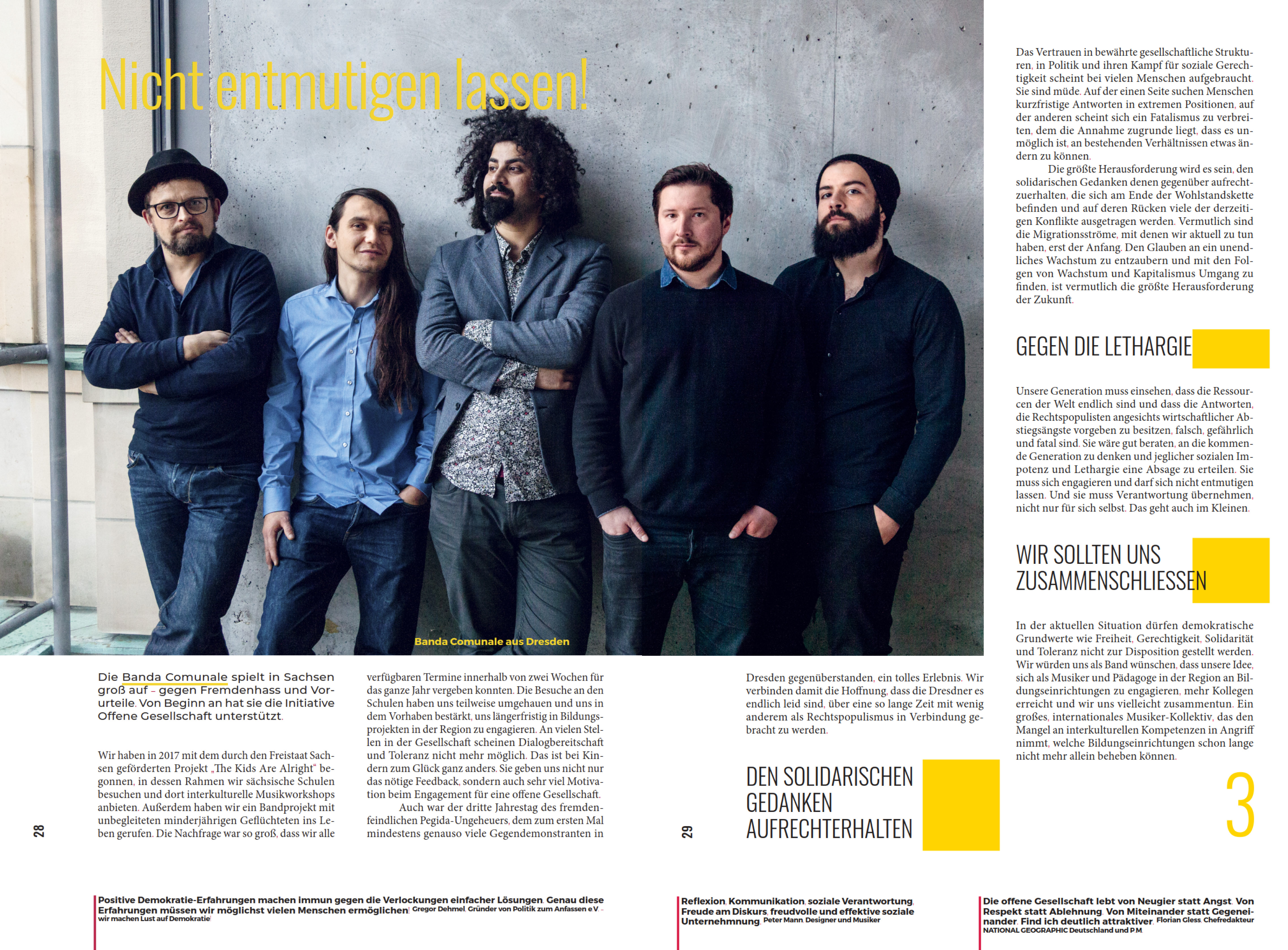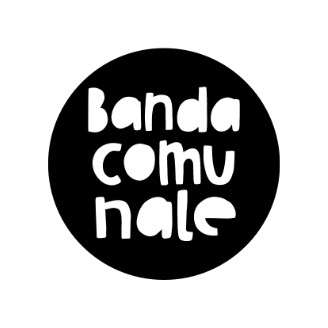Über die Banda Internationale...
BANDA COMUNALE ist BANDA INTERNATIONALE
Die elfköpfige Brass-Band „Banda Comunale“ hat sich 2015 um geflohene Musiker zur „Banda Internationale“ erweitert. Gemeinsam entstauben sie in Dresden die deutsche Volksmusik und andere Vorurteile.
Nach über 40 Konzerten gegen PEGIDA, gegen „Nein-zum-Heim“-Initiativen und für geflüchtete Menschen in Erstaufnahmeeinrichtungen hat die "Banda Comunale" beschlossen, dass sie einen Schritt weitergehen wollen: Unter den Geflüchteten musste es doch auch Musiker geben – Menschen wie sie selbst, die ohne ihr Instrument, ohne den Austausch mit Anderen und ohne das tägliche Üben einfach nicht sein können. Und sie hatten sich nicht geirrt: Musiker aus Syrien, Irak, Burkina Faso, Polen, Russland, Bayern und Deutschland gehören inzwischen fest zum Projekt: Der "Banda Internationale“.
Sozio-kulturelles Engagement war und ist die Grundlage der Kernformation „Banda Comunale“, die aus professionellen Musikern und Amateuren seit 2001 besteht. Die aktive und verantwortungsvolle Teilhabe an dem, was in ihrem Viertel, ihrer Stadt und darüber hinaus passiert, das Einstehen für Werte und Traditionen wie Weltoffenheit, Internationalisierung und Integration sowie ein entschiedenes Auftreten gegen rechte und neurechte Bestrebungen in Sachsen und Deutschland beschreiben die Grundfeste und Überzeugungen, die die „Banda Comunale“ seit dem Sommer 2015 nahezu zwangsläufig zur „Internationale“ werden ließen.
Nach zahlreichen Beteiligungen an Demonstrationen und Veranstaltungen gegen PEGIDA in Dresden seit dem Winter 2014/15, engagierte sich die Band unermüdlich für eine Willkommenskultur und spielte u.a. zahlreiche Konzerte in Erstaufnahmeeinrichtungen. Hier entstand im Sommer 2015 die Idee eines längerfristigen Projektes mit geflüchteten Musikern.
Das mittlerweile fast 20-köpfige Kollektiv mit Musikern aus Syrien, Palästina, Burkina-Faso, Iran und dem Irak hat seit Projektbeginn 2015 zahlreiche Preise gewonnen und mehr als 400 Konzerte in Dresden, in Sachsen und Deutschland gespielt. Großes, gemeinsames Ziel war es Heimatmusik neu zu interpretieren, Herzen zu öffnen, Vorurteile und Ressentiments abbauen zu helfen und zur Verständigung zwischen neuen und alteingesessenen Sachsen, Deutschen, Europäern beizutragen.
Regional, überregional und gar außerhalb Deutschlands wird das Projekt von einem immer größer werdenden Publikum verfolgt, zahlreiche Berichte in der Presse haben über den Modellcharakter der „Banda Internationale“ berichtet und deutlich gemacht, dass Musik ein Schlüssel zur Integration ist – auch und vielleicht gerade in Dresden.
Durch Kooperationen mit den Landesbühnen Sachsen, der Dresdner Hochschule für Musik „Carl Maria von Weber“, der Philharmonie Dresden, dem Staatsschauspiel Dresden und namhaften Musikern wie Sting, BAP, Jan Vogler und Konstantin Wecker sammelten die geflüchteten Musikerkollegen vielfältige Erfahrungen und etablierten sich als professionelle und gefragte Musiker in ihrer neuen Heimat.
BANDA COMUNALE is BANDA INTERNATIONALE
Banda Internationale is a collective of refugee and non-refugee musicians. They are united by the desire to change the existing conditions in Saxony, especially those in Dresden. They believe that prejudices should be dismantled and replaced with bridges between cultures, religions, and ethnicities. Through their music, they doing their best to help integration succeed and a more open Saxony to emerge.
In the early fall of 2015, the musicians of “Banda Comunale,” a brass band that formed in Dresden 15 years ago, began to look for musicians among the refugees arriving in the city, and they created a new constellation: Banda Internationale. Together, they are re-interpreting the concept of “folk music” by broadening their repertoire to include the music of the homelands of all of the participants. In weekly rehearsals, the musicians have worked together to arrange musical numbers – leading to a CD recording in the fall of 2016 and a German concert tour. The band has played more than 300 concerts together, and in 2017, the collective launched a project called “The Kids Are Alright.” For this project, the long-time and new members of the band hold workshops at Saxon schools; they have also started a band with unaccompanied refugee minors.
The success of the band and the enthusiasm with which they have been received by audiences is not surprising (everyone loves good music); what is truly remarkable about the project is the dedication of the musicians to the band. All of the initial members, as well as many of the new members, have day jobs. Despite the demands of work, family, learning the German language, and navigating German bureaucracy, they all generously give their time to their music, to each other, their community in Dresden, and to their audiences all over Germany.
Banda Internationale was nominated by the German Minister of Culture Monika Grütters for the new “Special Prize for Projects on the Cultural Participation of Refugees” in May 2016 and awarded first prize. Further, Banda Internationale has been awarded with the “Saxon Prize for Democracy,” “the Saxon Prize for Socio-Cultural Engagement“, and distinguished as an “Excellent Site in Germany, Land of Ideas” by the Deutsche Bank. In 2017, the collective received the “German Prize for World Music”, and was awarded 50,000 Euros with the “Power of Arts” prize from the initiative “Network for Young Ears” and the Philip Morris corporation. In December of 2017, they received the “EuroMed Dialogue Award 2017“ from the Anna Lindh Foundation, which was presented in Tallinn to them by mayor of Lampedusa, Guiseppina Maria Nicolini.

